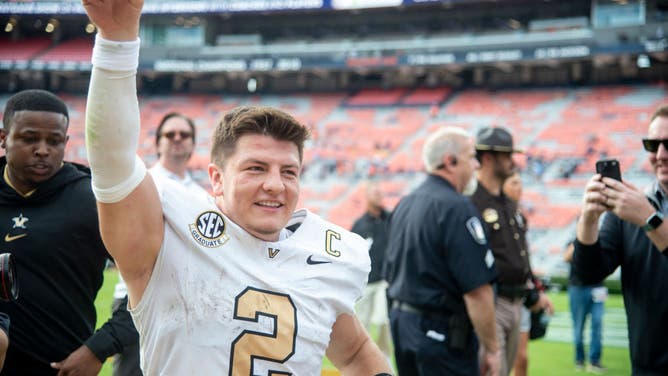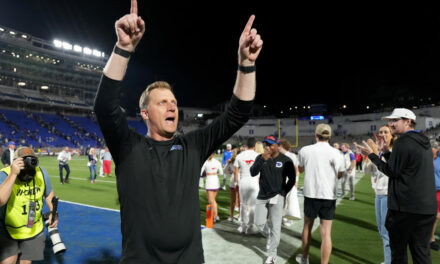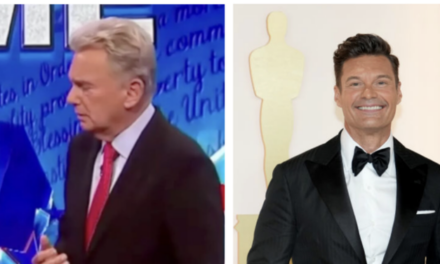We support our Publishers and Content Creators. You can view this story on their website by CLICKING HERE.
Vanderbilt quarterback Deigo Pavia is suing the NCAA for an extra year of eligibility that centers around his time playing JUCO football, and a judge granted a preliminary injunction on Wednesday.
In the lawsuit filed against the NCAA, attorney Ryan Downton argued that since the NCAA counts any junior college seasons towards their eligibility clock, and that since they have no meaningful way to make money in the JUCO ranks, he should be given another year of eligibility.
The argument centered around that having a player’s clock start at the JUCO level actually hurt them when it came to making money at the Division I level, and therefore, playing at the lower-tier status should not count towards their overall time spent at the next level.
After the court released its ruling, the NCAA put out a statement regarding the matter.
“The NCAA is disappointed in today’s ruling and wants all student-athletes to maximize their name, image and likeness potential without depriving future student-athletes of opportunities,” the statement noted. “Altering the enforcement of rules overwhelmingly supported by NCAA member schools makes a shifting environment even more unsettled. The NCAA is making changes to deliver more benefits to student-athletes, but a patchwork of state laws and court opinions make clear the partnering with Congress is essential for the future of all college athletes.”

AUBURN, ALABAMA – NOVEMBER 02: Quarterback Diego Pavia #2 of the Vanderbilt Commodores celebrates after defeating the Auburn Tigers at Jordan-Hare Stadium on November 02, 2024 in Auburn, Alabama. (Photo by Michael Chang/Getty Images)
Simply put, since the NCAA count a JUCO season towards their clock, and that the player cannot redshirt after their clock has run out, this is a clear violation of antitrust laws.
In the filing by Judge William Campbell, he states the following.
“The Court is not persuaded that restricting the NCAA Division I eligibility of former junior
college athletes to three or four years is relevant to the “differentiated athletic product” of Division
I football. The NCAA eligibility rules allow other forms of post-secondary education and athletic
competition without it “counting” against eligibility.”
Also, when it comes to players not having their eligibility affected by attending a prep-school, the judge said that the NCAA does not start their clock for those institutions, so why should JUCO be counted towards their ‘clock;.
“For example, the NCAA does not start the eligibility clock for prep school student-athletes even though those students can earn credit toward a degree and may compete athletically against junior colleges and other schools that qualify as “collegiate institutions.”9 And there are a number of reasons eligible student-athletes may be older and stronger than those on the traditional trajectory – military service, religious obligations, professional careers in other sports, or even independent athletic or academic work. (See e.g., NCAA Bylaw 12.8.1.2). Given the different treatment of other student-athletes with comparable
or more post-secondary experience, the NCAA’s assertion that the eligibility rules are necessary
to prevent age and experience disparities and preserve the quality of experience for student-athletes
falls flat.”
The ruling now allows Diego Pavia to return to Vanderbilt for another season, and that the school will not be punished for playing Pavia during this time. As for the NCAA, they will obviously be allowed to challenge this decision by the judge.
But, the overall news is that Deigo Pavia will be allowed to return for another season of football at Vanderbilt, or wherever he chooses to play.
“Defendant NCAA, its servants, agents, and employees, and all person acting in active concert or participation with the NCAA are hereby restrained and enjoined from enforcing NCAA Bylaw 12.02.6 to preclude Pavia from playing NCAA Division I football in 2025,” Judge William Campbell wrote in his order for the injunction.
This will certainly have a ripple-effect on the sport, but this matter only pertains to Diego Pavia at the moment. But, this opens the door for other players to join, or file their own lawsuit against the NCAA.

 Conservative
Conservative  Search
Search Trending
Trending Current News
Current News 





